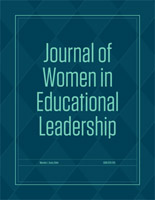Educational Administration, Department of

Journal of Women in Educational Leadership
Date of this Version
9-2007
Document Type
Article
Citation
Journal of Women in Educational Leadership, Vol 5, No. 4-October 2007 ISSN: 1541-6224
Abstract
The purpose of this study was to determine the extent to which organizational infrastructure and institutional leadership facilitated or hindered institutionalizing service learning as pedagogy at a small health professions college. Through interviews and content and discourse analysis, we found that data supported the notion that service learning "fit" the mission, however, data also revealed some resistance to using service learning on the part of some faculty members and administrators. Consequently, governance and communication channels appeared as barriers to institutionalization because the administration's words and deeds were incongruent. Nursing faculty'S espoused values and actual behaviors were congruent thus forcing them to lead for change from the bottom of their College hierarchy. Increased research on service learning as pedagogy can be found in the literature (Elyer & Giles, 1999; Furco, 2001; Giles & Elyer, 1998; Weglarz & Seybert, 2004). Service learning as pedagogy advocates for a combination of higher education curricula partnerships with community agencies by providing community services while creating learning centered, reflective environments for students. This pedagogical approach is particularly suited to nursing and to social work professions, typically female-dominated fields where much of service learning research was conducted (Hamner, Wilder, Avery, & Byrd, 2002). Gilligan (1982) realized that women often make decisions based on their connection with others. Gelmon, Holland, and Shinnamon (1998) found that sustainability for service learning in curriculum was a direct relationship between faculty and community partners, not surprising given the natural interaction between health care providers and the community. The researchers also noticed that when service learning in curriculum thrived, a relationship existedbetween faculty involvement, academic leadership, and institutional commitment.


Comments
Copyright © 2007 Pro>Active Publications. Used by permission.